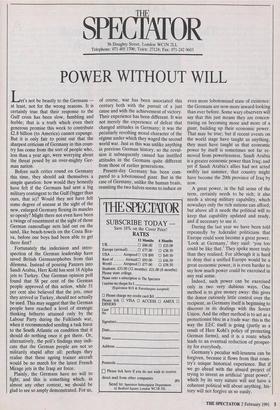SPECTATOR
56 Doughty Street, London WC1N 2LL Telephone: 071-405 1706; Telex: 27124; Fax: 071-242 0603
POWER WITHOUT WILL
Let's not be beastly to the Germans at least, not for the wrong reasons. It is certainly true that their response to the Gulf crisis has been slow, fumbling and feeble; that is a truth which even their generous promise this week to contribute £2.8 billion (to America) cannot expunge. But it is only fair to point out that the sharpest criticism of Germany in this coun- try has come from the sort of people who, less than a year ago, were worrying about the threat posed by an over-mighty Ger- man nation.
Before such critics round on Germany this time, they should ask themselves a simple question: how would they honestly have felt if the Germans had sent a big military contingent to the Gulf (bigger than ours, that is)? Would they not have felt some degree of unease at the sight of the new, enlarged Germany flexing its muscles so openly? Might there not even have been a twinge of resentment at the sight of those German camouflage nets laid out on the sand, like beach-towels on the Costa Bra- va, before our boys had been able to get there first?
Fortunately the indecision and intro- spection of the German leadership have saved British Germanophobes from that dilemma. Instead of pouring Panzers into Saudi Arabia, Herr Kohl has sent 18 Alpha jets to Turkey. One German opinion poll found that 58 per cent of the German people approved of this action, while 51 per cent also believed that the jets, once they arrived in Turkey, should not actually be used. This may suggest that the German people have reached a level of strategic thinking hitherto attained only by the Labour Party during the Falklands war, when it recommended sending a task force to the South Atlantic on condition that it should do nothing once it got there. Or, alternatively, the poll's findings may indi- cate that the German people are not so militarily stupid after all: perhaps they realise that these ageing trainer aircraft would be no match for the latest French Mirage jets in the Iraqi air force.
Plainly, the Germans have no will to fight; and this is something which, in almost any other context, we should be glad to see so amply demonstrated. For us, of course, war has been associated this century both with the pursuit of a just cause and with the achievement of victory. Their experience has been different. It was not merely the experience of defeat that changed attitudes in Germany; it was the peculiarly revolting moral character of the regime under which they waged the second world war. Just as this was unlike anything in previous German history, so the revul- sion it subsequently caused has instilled attitudes in the Germans quite different from those of earlier generations.
Present-day Germany has been com- pared to a lobotomised giant. But in the case of Germany, unlike the human brain, reuniting the two halves seems to induce an even more lobotomised state of existence: the Germans are now more inward-looking than ever before. Some wary observers will say that this just means they are concen- trating on becoming more and more of a giant, building up their economic power. That may be true; but if recent events on the world stage have taught us anything, they must have taught us that economic power by itself is sometimes not far re- moved from powerlessness. Saudi Arabia is a greater economic power than Iraq; and yet if Saudi Arabia's allies had not acted swiftly last summer, that country might have become the 20th province of Iraq by now.
A great power, in the full sense of the term, certainly needs to be rich; it also needs a strong military capability, which nowadays only the rich nations can afford; but above all it needs the political will to keep that capability updated and ready, and if necessary to use it.
During the last year we have been told repeatedly by federalist politicians that Europe could soon become a great power. `Look at Germany,' they said: 'you too could be like that.' They spoke more truly than they realised. For although it is hard to deny that a unified Europe would be a great economic power, it is even harder to say how much power could be exercised in any real sense.
Indeed, such power can be exercised only in two very dubious ways. One method is to give money away: this gives the donor curiously little control over the recipient, as Germany itself is beginning to discover in its dealings with the Soviet Union. And the other method is to act as a protectionist bloc in a trade war: this is the way the EEC itself is going (partly as a result of Herr Kohl's policy of protecting German farms), and it is a route which leads to an eventual reduction of prosper- ity for everybody.
Germany's peculiar will-lessness can be forgiven, because it flows from that coun- try's unique historical experience. But if we go ahead with the absurd project of trying to invent an artificial 'great power', which by its very nature will not have a coherent political will about anything, his- tory will not forgive us so easily.


















































 Previous page
Previous page